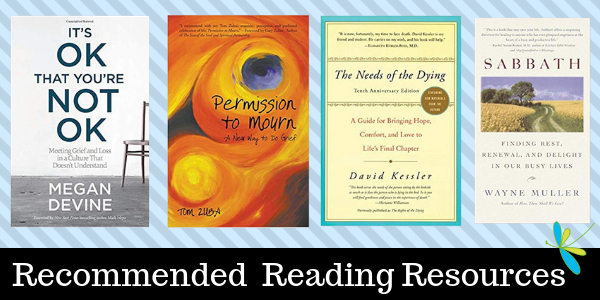Recently, I was on the phone with a friend whose mother had just died. She was in the early stages of processing the experience and was feeling overwhelmed with the gamut of emotions that come with the territory. She said to me “How do you do grief? I’ve never lost someone close to me before. You seem like you navigated it pretty well when your mom died. What’s the secret?”
While I don’t call myself a grief coach, I’ve supported dozens of clients over the years to process grief in different forms—the death of a loved one, the loss of a job, unwanted moves, the pain of divorce and more. If you find yourself in need of some support, set up a session with me and let’s talk. I’ll help if I can.
There are plenty of death and dying experts and grief counselors who will tell you all about the stages of grief and how you should walk through the experience. But in my opinion, the secret is this…
The only way to do grief is YOUR way.
Even though it is a universal experience, don’t ever let anybody tell you how you *should* do grief. It is such a deeply personal, unique situation for all of us.
- Some people give away the belongings of a loved one immediately. Others hang on to them for years.
- Some people talk about their beloved regularly. Others never mention their name.
- Some people cry every day and wear their emotions openly. Others are more stoic and reserved.
- Some people seek professional grief counseling. Others rely on support from a close circle of friends.
How I grieved the death of my father when I was only 24 (shock and denial) is different than how I grieved the loss of my first marriage at age 31 (anger, lots of anger), the miscarriage of my twins at age 39 (despair and depression) and the death of my mother when I was 46 (sadness, forgiveness, gratitude). Each situation was unique, each relationship was unique and I have grown and changed over the years.
I do, however, have a few insights about grief that might be helpful…
- It changes constantly. One week you might cry every day, but then you might not cry for a month. It might be years since your beloved has died, and out of the blue, something reminds you of them and brings you to your knees. You may feel angry, cheated, heartbroken, relieved, regretful or grateful. Sometimes you feel the physical pain in your body—in your heart, your head, your shoulders, or simply an overall fatigue. Other times, the grief is more cerebral…a wistfulness, a longing for what could be. Instead of assuming you’ve got it “figured out,” understand grief changes and morphs as time goes on.
- Create rituals. If you’ve been in my world for a while, you may remember I hosted a White Rose Release Ceremony in honor of my mom just five days after she died (read the story here and see the pictures here). On each anniversary since her passing, I buy a dozen roses to keep in our home this week and then I release them in the same creek by our house we honored her that day. It keeps me connected to the sacredness of that special ritual and also creates a container for me to express my emotions. Anniversaries, birthdays, and other special occasions can be hard. Creating a simple ritual on those days (lighting a candle, cooking a special meal, looking at old photos) can help you to process any emotions that arise.
- Tell stories. Whether part of a ritual remembrance or just a random afternoon while you are reminiscing, review the important times you spent with your loved one. Recall happy memories, or recount difficult times you endured together. If you have the opportunity to share the stories with people who also knew your loved one, that’s a bonus. There’s a Swedish saying that rings true for me: Shared joy is a double joy; shared sorrow is half sorrow. There are elements of witnessing one another in both sorrow and joy that can help to process the enormous loss of a loved one.
- Rest. Simply put, grieving is exhausting. It takes a huge amount of emotional, mental, physical and spiritual energy to grieve a loss which often leaves us feeling depleted and out of sorts. Whenever possible, if you are grieving a loss of any kind, build space in your calendar for rest and restoration. Sleep a little bit more, create more buffer time between commitments, and when possible, build in full days off from work or life to simply “be.”
- Read. When you don’t know what to do, what to say or how to be, a good strategy is to read. Immerse yourself in the comforting words of others. It can help to hear other’s stories and to feel understood. I find it helps to learn how others have coped in similar circumstances.

It’s OK That You’re Not OK by Megan Devine – Straight talk about how to grieve in a culture that doesn’t do grief well at all.
Permission to Mourn by Tom Zuba – Simple and powerful wisdom from a man who knows grief and loss all too well (two of his children and his wife died, all at different times).
The Needs of the Dying by David Kessler – This book was immensely helpful for me during the “anticipatory grieving” stage of knowing that my mother was dying.
Sabbath by Wayne Muller – This is my favorite self-care book about the power of rest.
Big hugs to you on this tender day,
Elizabeth
P.S. And if you know someone who is grieving right now, consider forwarding this email to them. You also may want to read my article The Best Gifts to Give Someone Who Is Grieving to give you ideas of how you can help.